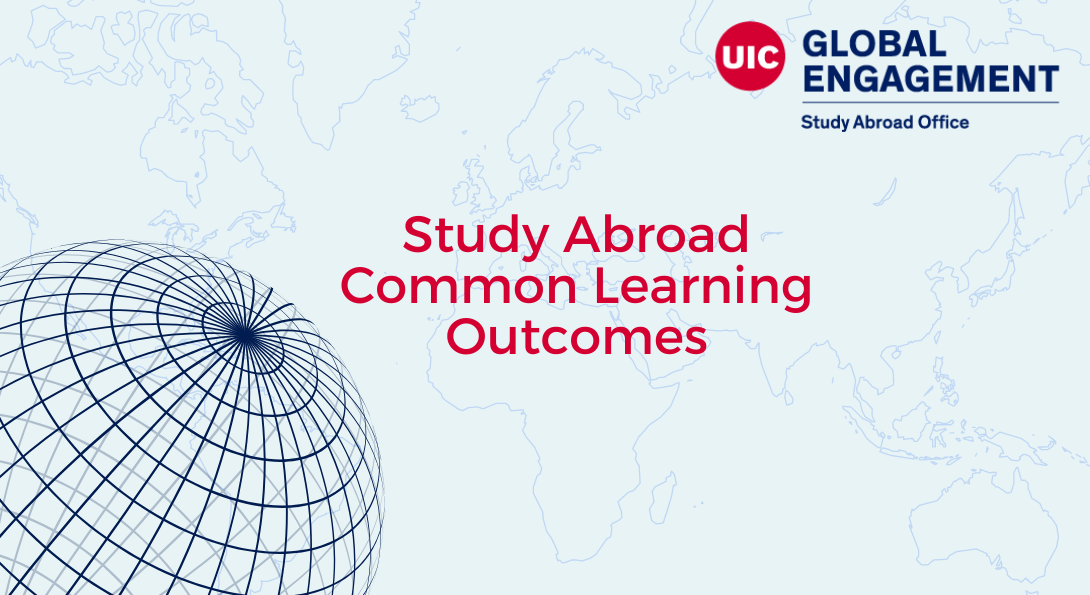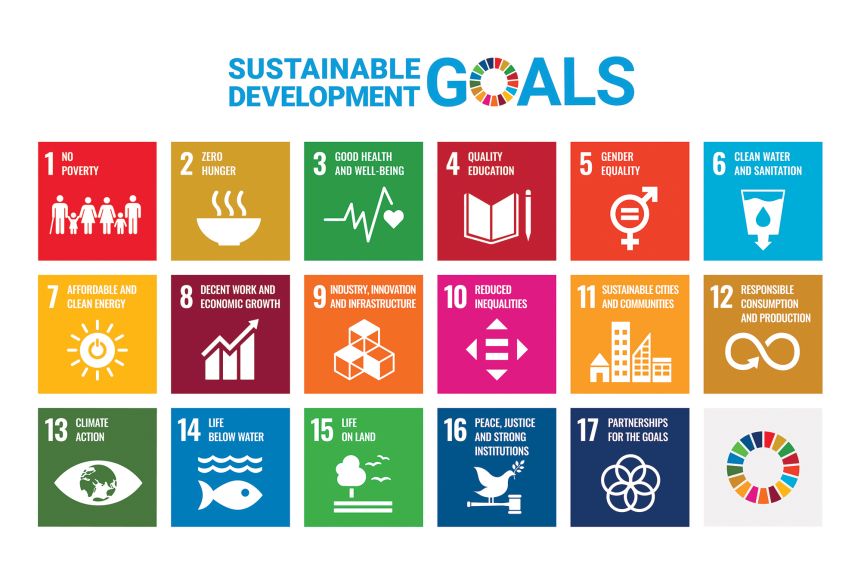UIC Study Abroad Common Learning Outcomes

In-Demand Skills for Our Interconnected World
In collaboration with the university's International Advisory Council and its Study Abroad Committee, the Study Abroad Office (SAO) has developed common learning outcomes for its faculty-directed study abroad programs. As a high-impact practice, study abroad incorporates experiential and project-based learning that can help students develop cognitive, intrapersonal, and interpersonal skills across personal, professional, and academic domains. In addition to the discipline-specific outcomes faculty directors incorporate into their programs, UIC Study Abroad Office programs are designed to help students develop important transferrable global and intercultural skills.
Introduction Heading link
-
Introduction & Theoretical Framework
Recognizing the potential that education abroad has to help students develop important intercultural skills that cross disciplines, the university’s Study Abroad Committee, a part of the International Advisory Council, set out to develop common learning outcomes for UIC’s faculty-directed study abroad programs during the 2023-2024 academic year.
The resultant learning outcomes were developed after a review of literature related to intercultural competency development in education abroad. The learning outcomes are grounded in the following key sources:
- Institute of International Education (IIE) report: Gaining an Employment Edge: The Impact of Study Abroad (2017)
- National Academies of Sciences report: Education for Life and Work: Developing Transferrable Knowledge and Skills in the 21st Century (2012)
- NAFSA: Association of International Educators: Intercultural Competence: A Definition, Model and Implications for Education Abroad (Deardorff, 2008)
- The Intercultural Development Inventory
- National Association of Colleges and Employers (NACE): Career Competencies
- United Nations Sustainable Development Goals (SDGs)
Additionally, the learning outcomes reflect the values and goals outlined in the UIC Study Abroad Office’s Mission & Vision statement, and those of UIC’s Campus Internationalization Plan.
The following individuals contributed to the development of the Study Abroad Common Learning Outcomes:
- Jennifer Olson (Chair, Study Abroad Committee; Visiting Associate Dean and Clinical Professor, College of Education)
- Juan José Cabrera-Lazarini (Visiting Research Professor and Faculty Liaison, Instituto Tecnológico y de Estudios Superiores de Monterrey)
- Rohan Dexter Jeremiah (Associate Dean for Global Health, College of Nursing)
- Annette Johnson (Clinical Associate Professor, Jane Addams College of Social Work)
- Alyson Lofthouse (Assistant Dean, Global Health Program, School of Public Health)
- Tom Moss (Associate Dean for Student Affairs, College of Architecture, Design, and the Arts)
- Kyle Rausch (Executive Director, Study Abroad Office)
-
U.N. Sustainabile Development Goals

The United Nations Sustainable Development Goals (SDGs) are the center of the 2030 Agenda for Sustainable Development, which provides “a shared blueprint for peace and prosperity for people and the planet.” The 17 goals aim to improve health and education, reduce inequality, and spur economic growth – all while tackling climate change and working to preserve our oceans and forests.
Faculty Directors of study abroad programs are encouraged to use the SDGs as an overarching framework when developing their programs. The UN SDG’s represent 17 of the most critical global challenges facing societies and the planet. Their applicability and relevance span disciplines, requiring an interdisciplinary approach in order to make progress toward the goals. The experiential and comparative learning of education abroad makes it an ideal vehicle for introducing students to the SDGs and helping them to reflect upon how their studies, career path, and personal values intersect with these critical global issues.
Resources:
- Advancing The UN Sustainable Development Goals Through Education Abroad (Forum on Education Abroad)
-
Learning Outcome 1: Intercultural Competence
Reflect upon interactions and relationships in a global context from multiple perspectives, analyzing how complex systems impact self and others.
Students who meet this outcome:
- Explore complex dimensions of diversity, equity, and inclusion around the world, including language, culture, identity, and power.
- Engage with differing perspectives and experiences while maintaining a sense of cultural perspective, including how culture informs beliefs, ways of thinking, biases, and privilege.
- Expand ability to cross boundaries associated with language, culture, histories, and status in order to bridge differences, recognize similarities, and collaboratively and equitably reach common goals.
-
Learning Outcome 2: Career Readiness in a Global Context
Develop capacity for in-demand career competencies that prepare students to work in diverse workplaces and to be successful collaborating with those who are from different backgrounds.
Students who meet this outcome:
- Proactively develop oneself through personal and professional learning, awareness of one’s strengths and weaknesses, and networking to build relationships.
- Demonstrate how to clearly and effectively exchange information, ideas, facts, and perspectives with persons inside and outside of an organization.
- Identify and respond to needs based upon an understanding of situational context and logical analysis of relevant information.
- Demonstrate the awareness, attitude, knowledge, and skills required to equitably engage and include people from different local and global cultures.
- Engage in anti-racist practices that actively challenge the systems, structures, and policies of racism.
- Demonstrate effective work habits, including punctuality, teamwork, problem-solving, and adaptability.
- Build and maintain collaborative relationships to work effectively toward common goals, while appreciating diverse viewpoints and shared responsibilities.
- Leverage technologies ethically to enhance efficiencies, complete tasks, and accomplish goals.
Resources:
-
Learning Outcome 3: Lifelong Global Learning
Develop an ongoing and self-motivated pursuit of knowledge that enhances personal development and creates an openness to new ideas and ways of thinking across diverse cultural contexts and viewpoints.
Students who meet this outcome:
- Explore and engage in new personal, academic, and/or professional opportunities that address real-life global challenges.
- Reflect upon perspectives and experiences different from one’s own to understand how one’s place in the world both informs and limits one’s knowledge.
- Develop the capacity to understand the interrelationships between multiple perspectives, such as personal, social, cultural, disciplinary, environmental, local, and global.
- Apply knowledge, skills, and abilities to contribute to local and global society in order to demonstrate informed global citizenship.